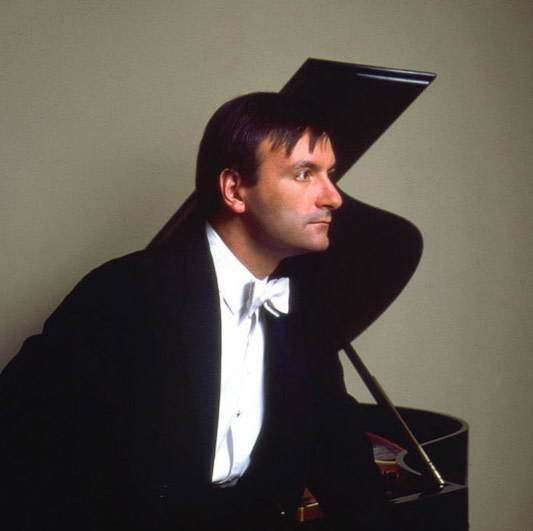Review: Pianist Stephen Hough

Image: Christian Steiner
"And now for something a little less tumultuous," said Stephen Hough as he began playing his own arrangement of a song by Bantock, the first of several encores at Lincoln Hall on Monday night. With war horse Romantic works at the heart of the program, "tumultuous" was an accurate description of the recital—but perhaps he was referring to his travel itinerary.
The acclaimed British pianist has been globetrotting the last several months in concerto performances with the National Symphony and the Philadelphia Philharmonic with future dates at Amsterdam's Concertgebouw, not to mention recitals in places large (New York's Alice Tully Hall and London's Wigmore Hall) and small (Logan, Utah; Fresno, California; and yes, Portland State University). An audience favorite in performances with the Oregon Symphony (the Brahms Second concerto in 2007, or Tchaikovsky's concerto in 2008), Hough appeared in this solo recital as the capstone to Friends of Chamber Music's season, to great effect.
Hough began with miniatures by composers more known for their oversize orchestral output. Schoenberg's six little pieces Op 19 were conceived as an extreme diet from the "excesses" of late Romanticism and are perhaps most remarkable in that this handful of notes heralded a new era in atonal, or at least untonal, music. Lullaby-like pieces by Richard Strauss, Richard Wagner and Anton Bruckner followed, each revealing a more intimate side of these composers known for their soaring tone poems, epic operas, and marathon symphonies.
Appetizers dispensed with, the meat of the program was really a double entrée: Brahms's late Klavierstücke Op 116 and Chopin's rhapsodic Ballades. The first piece of Brahms's 116 seems to offer pianists a choice of velocity versus contrapuntal clarity, and Hough took the latter road, emphasizing the bass and inner voices with a moderate tempo in its opening clarion calls. The following fantasies and intermezzi were all deployed in bravura style, with catch-me-if-you-can runs in no. 3, crystal-clear transparency in no. 4 and exceptional lyricism in the E major intermezzi no. 6, arguably the emotional center of the cycle.
Chopin's Ballades, each introduced with a simple, songlike melody that winds its way into the heights of musical drama, were also stunningly performed. As the archetype pianist/composer, Chopin demands a fusion of musicianship and pianistic virtuosity unlike many others, and Hough plays with a real commitment and a sense that he is pushing to the edge of his abilities just as Chopin pushed his musical themes to the edge of recognition, and in some cases to the edge of noise. While standing ovations are virtually pro forma at Portland concerts, this one was well deserved.
Miss this concert? You'll have to wait, but Hough is slated to perform Beethoven's first piano concerto with the Oregon Symphony in May 2015.




